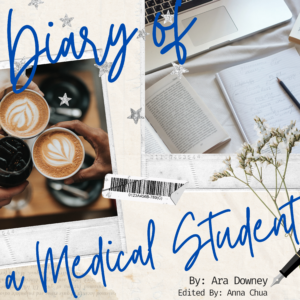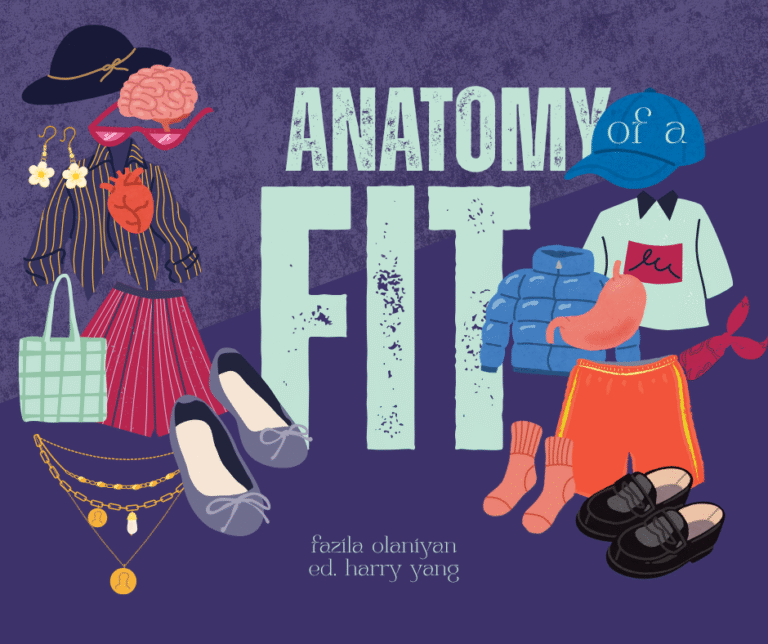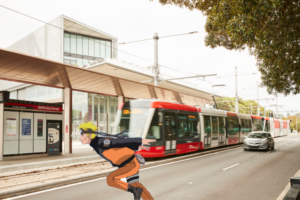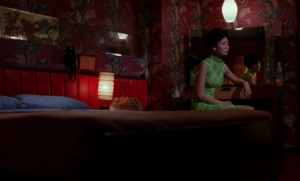
By Jess Sawang
i. neglected, broken, untouched
The sweltering summer breeze drifted in through the opening of her window that she had cranked open in desperation, searching for some respite from the oppressive heat.
She licked the dotted perspiration off the top of her lip and hummed off-tune, husky notes from a song whose melody had burrowed its way deep into her mind, its words and origins long forgotten.
A thick brush, with some splayed bristles bent outwards, moved across the earthenware in broad strokes. The burnt orange of the terracotta fell to the pristine white of the glistening paint.
She leant back and sighed, rolling her neck from side to side, chasing away the soreness.
She picked up another brush, this one smaller than the last, and dipped the tip into a deep, angry red.
Steadying the pot with one hand, she leaned in until she was close enough that the chemical stench of the paint became overpowering, making her nose burn and eyes water. She lifted her other hand and moved forward slowly. The tip of her brush grazed the earthenware.
Her humming stops.
The revving of cars and the distant shrieking of kids playing, all faded into nothingness.
A thin red line began to form on the pot, unwavering and perfect in its certainty and straightness. Beautiful in its delicacy. She turns the pot slowly, around and around, the slim red line trailing after her brush.
The first ring was completed.
She took a deep breath, allowing herself a small smile before she dipped her brush back into the red, and started another line, repeating the process.
Sweat gathered atop her lip once again, though this time, it had nothing to do with the heat.
Her ringtone pierced the air. Her heart jumped to her throat. Eliza started, her brush jerking up in tandem with her knee, which hit the table with a clatter. A thick, jagged red line streaked upwards, defying the otherwise perfect rings. The pot slipped free from her hand, wobbling precariously on the precipice of the table. She surged forward, chasing the earthenware as it topples off the edge. A crack rang out in the silence. She flinched.
The orange inside of the shards provided a jarring contrast to the white outside, that was now tainted with specks of dust from her tiled floor. The rough and uneven red stripe, the mistake, glared from one particularly large shard.
The jagged scar was obtrusive, unkind, heinous in appearance. Broken beyond repair. This failure spat ridicule at the numerous and unrelenting hours she had spent working the clay. She kicked the shards to the side, wiped her hands on her yellowing apron and answered her phone, “What do you want?”
“Hello ma’am, are you Miss Eliza Wu?”
“Yes. What about it?” The curdling disappointment she felt leaked out into her tone, manifesting as abrupt rudeness and slight aggression.
“I’m calling to tell you that your mother, Mrs Zhijun Wu, has been admitted via the ambulance due to a fall down the stairs. She is…” The words dwindled into static as she clutched her phone in a too-tight grip.
She hadn’t seen nor talked to her mother for over two decades. Too often were thoughts of her mother drowned out by their last shared memories that consisted of raised voices and sobbing. A ceramic vase shattered on slammed doors was their final goodbye. Anger extended days of silence into weeks, pride extended weeks into months, bitterness extended months into years. She had cut her mother out of her life with a pair of rusty scissors and had left that wound to fester, abandoned.
A sour taste lingered in the back of her throat.
She was still her mother. No matter the past, Eliza still cared.
“Is… Is she alright?”
“She has no life-threatening injuries, Miss Wu, though it is unlikely she will fully recover from the fall.” The crackling of the bad reception hurt her ears. The voice continued on, detailing her mother’s injuries.
Eliza remained silent, chewing on her lip. The taste of copper flooded her mouth. Her lip stung.
“When can I visit her?”
ii. once lost, now found
The pungent smell of hospital antiseptic stung her nostrils. Her bitten fingernails tapped a frantic rhythm on the back of her phone. The clack of her boots against the linoleum came to a halt.
She stared. Room 316.
The thumping of her heartbeat sounded deafening compared to the background rustling and beeping that drifted through the hospital hallway.
She drew in a deep breath until her lungs burned from too much air. She contemplated turning around and leaving. She would come back another day, when her hands weren’t constantly fidgeting and her breath came easier.
The door swung open.
A fresh-faced nurse jerked her head up, away from her clipboard, and let out a squeak, “I’m so sorry, I wasn’t looking at where I was going. Are you a visitor? Come in! Mrs Wu is just eating.”
The nurse swept past Eliza with a rustle of her scrubs and an apologetic smile.
The opened door provided her with a glimpse into the room.
A half-eaten banana, overripe with brown spotted skin, lay abandoned on the tray in front of a woman that resembled a skeleton more than her mother. The woman turned her face, sunken eyes staring straight at Eliza.
Was that her mama?
Her feet moved, propelling her past the open door to stand in front of the foot of the bed.
“Mother.” That word felt unfamiliar on her tongue. She had always called her mother mama but that term seemed too familiar for the stranger in front of her. This wasn’t her mama.
Her mother opened her mouth.
Eliza shrunk back, not knowing what to expect after decades of silence.
Nothing but a croak came out.
Eliza watched as her mother sipped from a styrofoam cup, holding it with hands that trembled so badly that Eliza worried the water would spill.
Her hands were nothing more than just spotted skin that stretched over brittle bones. These weren’t the same hands of her mama that handled a hefty butcher’s knife with ease and swiftly sliced blocks of meat.
“Eliza…” She rasped. Her mother’s voice used to be so smooth, humming lullabies and folk tunes to Eliza whenever she had trouble sleeping.
“Long time no see, mother. You look…” She looked so fragile lying in the hospital bed with the hospital gown dwarfing her frame.
Quietness hung uncomfortably in the air save for the buzzing of the overhead lights and the incessant tap-tap-tap of Eliza’s fingers that pervaded the room. Eliza wished she hadn’t drunk that extra coffee this morning.
Eliza cleared her throat, “I heard that you needed someone to help take care of you at home because of your fall… do you have anyone to do that? Or do you want me to hire a caretaker?”
Eliza couldn’t be her mother’s caretaker. It wasn’t an option. She was sure that it would be a disaster in the making if they lived in the same house again. There had been too much said between them.
Running away from your problems, again, Eliza? Like you always do? And this time you are leaving your poor mama behind?
“Mama is fine, Eliza. No worries.” It was just like her mama to insist that nothing was wrong. During Eliza’s childhood, when deep shadows lined her eyes and bills piled up on the kitchen counter, her mama had looked up at Eliza through watery eyes and said Everything is okay, Eliza, no worries. Even now, when every breath she took was a struggle and her bones looked as fragile as a bird’s, she always insisted that Eliza shouldn’t worry about her because Mama is fine, mama can take of herself.
“No, you aren’t, mother. I talked to the doctor, you’re likely to fall again or get injured because you’re old. You need somebody to look after you.”
“Mama is fine. Do not worry.” There it was again, that unshakable stubbornness. She couldn’t help but stifle a smile, she found a sense of comfort and familiarity in that aspect of her mama.
If she hired a caretaker, her mother would dismiss them immediately, or at the very least, make the caretaker’s job so miserable that they would quit. Eliza knew this as a fact, just as the sky was blue and the grass was green. Her mama was bullheaded like that. The only plausible solution would be for Eliza to take care of her.
Leaving her mother to fend for herself and running away, yet again, was the coward’s way out. Resentment had dug a chasm between the two, but Eliza was not so heartless that she would willingly allow her mother to live alone and impaired and at risk.
The next time Eliza answered the phone, she did not want to be greeted with condolences and left with a cold, silent, empty house that judged her. She did not want to be left alone with regrets that burrowed deep into her skin, whispering that she should have done something more.
Maybe they could put the past behind and start anew. Maybe, just maybe, they would even be able to go back to the way they were before Eliza had slammed the door in her face and left.
Eliza wanted to share more moments with her before her mother, her mama, was snatched up by the ruthless cycle of life and death.
“Let’s just go home, mama.”
I’ll take care of you, mama, just like how you took care of me when I was young.
iii. pieced back together, cracks of gold
“You kept my teapot?” Eliza spooned jasmine tea leaves into a misshapen teapot. Eliza thought the ugly thing would have ended up in the trash with its stunted spout, cracked glazing and muddy brown colour.
“You made it.” Her mama said, sitting next to the window with white paint peeling off its frame. Her face was illuminated by the dim light of an overcast day that deepened her wrinkles and made her look more tired than she was.
“You could’ve bought a better one.” Eliza turned the kettle on with a click.
“Mama missed you.”
Eliza fell quiet.
She didn’t know what to think of that. She had always thought that her mama would have stowed away any reminder of her disgrace of a daughter who had flunked out of university and upped and left to travel the world on a shoestring budget.
“What do you want to eat?” Eliza turned away from her mama to scan the pantry, pondering.
“Let mama make food.”
She heard the rustling of her mama’s clothes as she stood up and the tap-tap-tap of her mama’s walking stick as she came over.
“No, mama, sit down. You just got out of hospital, rest.”
She would make her mama congee, just like the congee that she remembered her mama had made Eliza when she was sick.
Only the patter of rice grains falling could be heard as Eliza scooped up rice and poured it into a pot, filling it with water. Again, she felt that suffocating silence. She could not remember the last time words had fallen naturally between them. She didn’t know if her mama still held some sort of resentment or shame towards her, so she had navigated the conversational waters cautiously. Their talks consisted of nothing with substance nor meaning. Eliza wished she could turn the knob of time backwards to before, when she could confide in her mother as easily as she took in a breath of air.
She pulled out a plate of leftover pan-fried fish, tossing it into the pot and setting it to boil.
She remembered the time when her mama had taught Eliza how to cook pan-fried fish, their fingers were sticky with batter and their faces were scrunched up in laughter. Memories of better times Eliza rarely indulged in for they often welcomed a pang of pain. Long pauses and stilted speech were no substitute for the warmth they once shared.
She scooped out the fish congee into two bowls, setting one down in front of her mother, “Here you go, mama.”
She tried a spoonful. The congee was a tad bit bland and the fish was still cold in the middle. She had never claimed to have an ounce of her mama’s talent for cooking.
“Mama… I’ve been thinking a lot recently, about the past, and the future too. I want to make things right, before…” The words stuck in her throat. She thought that maybe if she didn’t say them, they wouldn’t come true. Eliza’s eyes scanned over her mama’s frail body, even after weeks of seeing her mother like this, so feeble and sickly, she had still not gotten used to the sight of her mama at death’s door.
Eliza fixed her gaze on a spot of plaster that peeled from the walls, “I don’t regret travelling the world because even though I might not be earning thousands as a business consultant, I’m happy now! But the way I acted was wrong, I was being unreasonable and harsh towards you and I’m…”
Eliza’s eyes stung and she could feel the tell-tale burn of tears. She flicked her gaze towards her mama. Her mama’s eyes were soft and her face was gentle.
“Mama is sorry.” Her mama’s bony hands encased Eliza’s own paint stained fingers, “Mama had a lot of time to think and… mama was wrong too. If Eliza is happy, mama is also happy.”
Eliza started in surprise. Never before had she ever heard her mama apologise. The mama from her memories, was a stubborn woman and she had never admitted that she was wrong, even when the evidence was laid bare. The mama from her memories would never have apologised, even if her life was on the line. Her mama had changed, for the better, it seemed, but Eliza couldn’t help but feel that these changes made her mama feel almost alien.
“I’m sorry too, mama.” Eliza’s voice cracked.
They would never go back to the days when Eliza would say I love you, mama as easily as one said hello. They were too different now. They were almost strangers, but not quite, connected by foggy memories and a common last name, but nothing more. One apology would not miraculously mend their relationship after decades of radio silence.
But this was a start to getting to know this mama that looked, and sometimes felt, like a stranger to Eliza. They may never regain the comfortable familiarity that they had during Eliza’s childhood, but maybe they would be able to gain some semblance of familiarity in time.
Her mama took a hold of the teapot, but it was heavy and her hands were feeble and shaking from age. It slipped out of her grasp and shattered on the wooden floor.
Her mama’s eyes lingered on the broken pieces, looking at them with deep regret.
She made to apologise, but Eliza interjected, “Don’t worry, mama. I learnt this new technique to fix broken things, and it makes it really pretty. It’s called kintsugi.”
Eliza had learnt about it after trying to fix the white pot with red rings that she had dropped when she had gotten the call from the hospital. Back then, she had harboured a strong disgust for imperfections, and outlining them, let alone in gold, would have been unthinkable to her. Yet when she had tried to repair it, evidence of the cracks would not completely disappear, no matter how hard she tried. It looked wrong when she tried to brush over her mistakes. Flaws and breaks were not meant to be hidden away but were to be accented as a reminder of the past, so that the future would not repeat its mistakes.
A day later, Eliza returned the teapot to her mama.
It wasn’t perfect; the pieces of pottery were not completely aligned, chips were still missing from the spout and it would never be used to hold hot tea like it used to – it was not completely whole, in the entire sense of that word.
But, it was together again, with golden lacquer proudly marking out the cracks in the once broken.













































































































